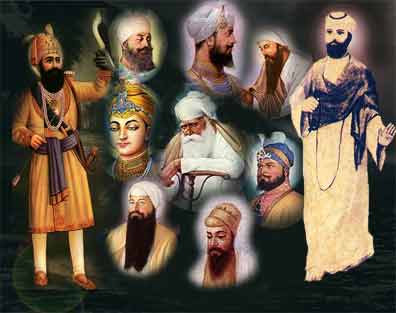ګرونان د شېخوپوره ولسوالۍ په تلوندي (ننني نانكانه صاحب) كې په ۱۴۴۹ز كال يوه كهتري كورنۍ كې زېږېدلې. كه څه هم ګروهانك په ښوونځي كې چندانې زړه كړې نه وې كړې، خو بيا هم د ځوانۍ له دور څخه يې په ژورو سوچونو او فكرونو كې ډوب ؤ. دې له هر ډول دنوي كروبار څخه بېزار ؤ، او چندانې زړه يې وسره نه لږېده. پلار يې له ځان سره بزګرۍ كې ولګاوه، مګر ده به هرهغه څه په فقيرو او غريبو وېشل چې له زمكې به يې ترلاسه كړل، پلار يې لدې كارونو څخه تنګ شو، نو په كلي كې يې ورته هټۍ جوړه كړه، هورې يې هم همدا حال ؤ، ټوله هټۍ يې په مسكينانو او نادارو ووېشله. پلار يې ناچار دې د خپل زوم څنګ ته چې په سلطانپور كې اوسېده، ورولېږه. هورې يې له نواب دولت خان لودي سره كاروبار پېل كړ. ده پوره ۸ كاله د هغه په كاله كې كار وكړ. پدې اته كاله كې به هر سهار په تياره كې د سيند غاړې ته وتو، او له خپل ملګري ... سره به يې په يخه هوا كې لمبل، بيا به ژور غور و فكر كې ډوب ؤ. د سكانو د مذهبي كتابونو په حواله دې يوه ورځ نوموړي سيند ته ووت جامې يې د سيند پر غاړه پرېښودې او د لامبو په نيت ورګډ شو، مګر كله چې د اوبو منځ ته ورسېد، نو همداسې ډوب شو، خلكو شورماشور جوړ كړ، نواب دولت خان لامبووهونكي راوغوښتل ترسو دده مړې پيدا كړي، مګر پدې ونه توانېدل. درې ورځې پس دې له هماغه ځاى څخه راووت، او دا شعار يې وركاوه چې ((نه هندو نه مسلمان، بلكه ټول يو انسان). پدې ډول دا د سكانو يو شعار وګرځېد. كله چې به چا ورڅخه پوښتنه وكړه نو ده به په ارامه او كراره ځواب وركړ. سكان پدې ګروهه دي چې دده له الله سره كتنه وشوه. او هغه ورته لارښوونه وكړه چې خلك سمې لارې ته راوبولي. هغه لارښوونې چې بابانانك ته وشوې ترڅو خلك ورته راوبولي په دې ډول دي چې: ((څښتن يو دى، د چا نوم چې حق دى، نه پنا كېدونكې، غېر مخلوق او په خپل ځان متكي ذات دى. لدې ورځې څخه وروسته نانك د حاكم نوكړي پرېښوده، او د ۳۰ كلونو په عمر يې د بلنې كار پېل كړ. ده د پرله پسې سفرونو يوه لړۍ پيل كړه، چې ددې لړۍ په لړ كې يې د هند په ټولو مهمو ځايونو او د مسلمانانو د زيارتونو څخه ليدنه وكړه، دې چې به كوم ځآى ته ورسېد نو د هغه ځاى له ملنګانو، مريدانو، پنډتانو او راهبانو سره به يې هغوې د مذهبي ګروهو او رسومو د بې ګټې زباتولو كوښښ كاوه. خلكو ته به يې د ښو اخلاقو او رښتيا ښوونه كوله....
ګرونانك د ۷۰ كلونو په عمر كال ۱۵۳۹ز كې ومړ او دوه زامن ورڅخه پاتې شول. د سريچن په نامه زوى يې د اداسي په نامه ډلې بنسټ كېښود. ګرونانك له خپل مرګ څخه لږه موده مخكې خپل يو نږدې مريد انګد د سكانو د ګرو په توګه خپل ځاېناستې وټاكه. د ځاېناستوب د رسم ترسره كولو څخه وروسته يې دا اعلان وكړ چې انګد همدې ګرونانك دى، او د همده اروا به په هغه كې ورګډه شي. نانك لا له مخكې څخه د اروا د راګرځېدو تناسخ اروا خبره كړې وه، مګر د انګد په اړه لدې اعلان څڅه وروسته دا ګروهه (تناسخ) په سكانو كې ښه پخه شوه، چې د نانك اروا به د هر راتلونكي مشر ګرو ته ورلېږدول كېږي.
Guru Nanak Dev[1] (Template:Lang-pa, Template:IAST) (Born in Nankana Sahib, Punjab, (now Pakistan) on 20th October 1469 – 7 May 1539, Kartarpur, Punjab, India), was the founder of Sikhism, and the first of the ten Sikh Gurus.
Beside followers of Sikhism, Guru Nanak Dev is revered by Hindus across the Indian subcontinent.[2] His primary message to society was recorded to be "devotion of thought and excellence of conduct as the first of duties".[3]
|
|
د ګروبابا نانك دېو د ژوند کيسې
The stories of Guru Nanak's life are collected in writings known as the 'Janamsākhīs'. The most popular Janamsākhī purports to have been written by Bhai Bala a close companion, before Nanak died[4]. However, the writing style and language employed have left scholars such as Max Arthur Macauliffe certain that they were composed after his death.[5]
Bhai Gurdas, the scribe of the Gurū Granth Sāhib, also wrote about Nanak's life in his vārs. However, these too were compiled after Guru Nanak's demise, and are less detailed than the Janamsākhīs. Sikhs tend to hold Gurdas's accounts in higher esteem because of the author's generally perceived trustworthiness.
د ژوند لومړې پير
Guru Nanak was born on 20 October 1469 in a Hindu family of the Bedi Khatri clan,[6] in the village of Rāi Bhōi dī Talvaṇḍī, now called Nankana Sahib (after the Guru), near Lahore, Pakistan.[7] Today, his birth place is marked by Gurdwara Janam Asthan. His father, Mehta Kalyan Das Bedi, also known as Mehta Kalu, was the patwari (accountant) of crop revenue for the village of Talwandi under the Muslim landlord of the village, Rai Bullar who was responsible for collecting taxes. Guru Nanak's mother was
Tripta Devi and he had one older sister, Nanaki
The Janamsākhīs recount in minute detail all the circumstances of the birth of the guru. They claim that at his birth, an astrologer who came to write his horoscope insisted on seeing the child. On seeing the infant, he is said to have worshipped him with clasped hands. The astrologer then remarked that he regretted that he should never live to see young Guru Nanak's eminence, worshipped as he should be, not only by Sihks, but Hindus and Muslims alike.[8]
At the age of five years Nanak is said to have begun to discuss spiritual and divine subjects. At age seven, his father Mehta Kalu enrolled him at the village school.[9] Nanak left school early after he had shown his scholastic proficiency. He then took to private study and meditation.[10]
All the Janamsākhīs are unanimous in stating that Nanak courted the retirement of the local forest and the society of the religious men who frequented it. Several of them were profoundly versed in the Indian religious literature of the age. They had also travelled far and wide within the limits of ancient India, and met its renowned religious teachers. Nanak thus became acquainted with the latest teachings of Indian philosophers and reformers.[11]
تجلی او بيا راښکاره کېدنه
Sikh tradition states that at the age of thirty, Nanak went missing, and was presumed to have drowned after going for one of his morning baths to a local stream called the Kali Bein or the Humber Bain. Three days later he reappeared and would give the same answer to any question posed to him: "There is no Hindu, there is no Muslim" (in Punjabi, "nā kōi hindū nā kōi musalmān"). It was from this moment that Nanak would begin to spread the teachings of what was then the beginning of Sikhism.[12] Although the exact account of his itinerary is disputed, he is widely acknowledged to have made four major journeys, spanning thousands of kilometers. The first tour was east towards Bengal and Assam, the second south towards Ceylon via Tamil Nadu, the third north towards Kashmir, Ladakh and Tibet, and the final tour west towards Baghdad and Mecca.[13]
Nanak was married to Sulakhni, the daughter of Moolchand Chona, a rice trader from the town of Batala. They had two sons. The elder son, Sri Chand, was an ascetic and he came to have a considerable following of his own, known as the Udasis. The younger son, Lakshmi Das, on the other hand was totally immersed in worldly life. To Nanak, who believed in the ideal of rāj maiṁ jōg (detachment in civic life), both his sons were unfit to carry on the Guruship.
د سکهيزم درې سنې
It was in Sultanpur that Guru Nanak Dev formalised the three important pillars of Sikhism:
-
Naam Japna: Chanting the Holy Name and thus remembering God at all times (often meditation).
-
Kirat Karō: Earning an honest living.
-
Vaṇḍ Chakkō: Sharing with others.
نورې ګروهې او رسوم
Guru Nanak had many beliefs which were not popular at the time but are now widespread.
-
Equality of Humans: When throughout the East and West Slavery and race discrimination was rife, and disrespect amongst the different classes and castes was at its peak, Nanak preached against discrimination and prejudices due to race, caste, status, etc. He said: "See the brotherhood of all mankind as the highest order of Yogis; conquer your own mind, and conquer the world." (SGGS page 6); also "There is one awareness among all created beings." (Page 24) and finally "One who recognizes the One Lord among all beings does not talk of ego. ||4||" (page 432). He urges all the peoples of the world to "conquer" their minds to these evil practises. All human beings had the light of the Lord and were the same – only by subduing one's pride and ego could one see this light in all.
-
Equality of Women: In about 1499 when society offered little status or respect to women, Nanak Dev sought to elevat the position of women by spreading this message: "From woman, man is born; within woman, man is conceived; to woman he is engaged and married. Woman becomes his friend; through woman, the future generations come. When his woman dies, he seeks another woman; to woman he is bound. So why call her bad? From her, kings are born. From woman, woman is born; without woman, there would be no one at all. O Nanak, only the True Lord is without a woman." (Page 473). In so doing he promoted the equality of women in the 15th century. Nanak Dev also condemned the ritual of Sati some 300 years prior to the British doing so.
-
Universal message for all People It had been a custom at the time for religious leaders to address only their own congregation, and for segregation of the different religions – but Nanak Dev broke with tradition, and spoke to all of humanity. To the Muslim he said: "And when, O Nanak, he is merciful to all beings, only then shall he be called a Muslim. ||1||" (page 141"; to the Hindu, he said "O Nanak, without the True Name, of what use is the frontal mark of the Hindus, or their sacred thread? ||1||" (page 467); and to all he preached: "To take what rightfully belongs to another is like a Muslim eating pork, or a Hindu eating beef." (Page 141).
Upon being asked which religion, Hinduism or Islam, was the true path to God, he replied that the true way to attain God was to worship Him who is eternal and contained in the whole Universe.
Joti Jot Samaye
Spending the last fifteen years of his life in Kartarpur, the Guru would wake at dawn and recite his daily prayers. At daybreak, he would address his followers. He worked in the field and earned his livelihood. He worked in the Langar; or community kitchen, where food would be partaken by Nanak's followers irrespective of their caste or creed.
On 22 September 1539, aged 70, Guru Nanak met with his demise, after he had requested his disciples to sing the Sohila (the praise of God).
Folklore
According to Sikh history it says that upon the death of Guru Nanak Dev, his Hindu followers wanted to cremate the remains while the Muslim followers wanted to bury the body following Islamic tradition. However on raising the cloth under which the Guru's body lay, some fresh flowers were found which were shared between his followers. The Hindus cremated their flowers whereas the Muslims buried theirs. [citation needed]
دا هم وګورئ
-
اسلام او سکهيزم






